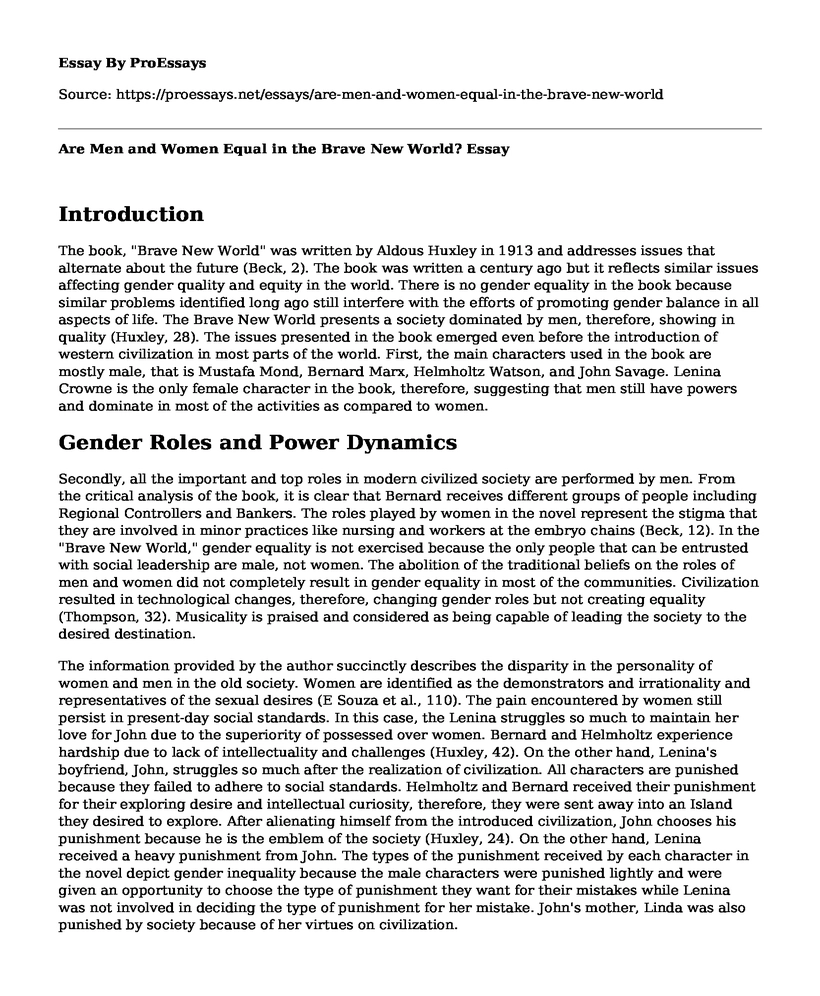Introduction
The book, "Brave New World" was written by Aldous Huxley in 1913 and addresses issues that alternate about the future (Beck, 2). The book was written a century ago but it reflects similar issues affecting gender quality and equity in the world. There is no gender equality in the book because similar problems identified long ago still interfere with the efforts of promoting gender balance in all aspects of life. The Brave New World presents a society dominated by men, therefore, showing in quality (Huxley, 28). The issues presented in the book emerged even before the introduction of western civilization in most parts of the world. First, the main characters used in the book are mostly male, that is Mustafa Mond, Bernard Marx, Helmholtz Watson, and John Savage. Lenina Crowne is the only female character in the book, therefore, suggesting that men still have powers and dominate in most of the activities as compared to women.
Gender Roles and Power Dynamics
Secondly, all the important and top roles in modern civilized society are performed by men. From the critical analysis of the book, it is clear that Bernard receives different groups of people including Regional Controllers and Bankers. The roles played by women in the novel represent the stigma that they are involved in minor practices like nursing and workers at the embryo chains (Beck, 12). In the "Brave New World," gender equality is not exercised because the only people that can be entrusted with social leadership are male, not women. The abolition of the traditional beliefs on the roles of men and women did not completely result in gender equality in most of the communities. Civilization resulted in technological changes, therefore, changing gender roles but not creating equality (Thompson, 32). Musicality is praised and considered as being capable of leading the society to the desired destination.
The information provided by the author succinctly describes the disparity in the personality of women and men in the old society. Women are identified as the demonstrators and irrationality and representatives of the sexual desires (E Souza et al., 110). The pain encountered by women still persist in present-day social standards. In this case, the Lenina struggles so much to maintain her love for John due to the superiority of possessed over women. Bernard and Helmholtz experience hardship due to lack of intellectuality and challenges (Huxley, 42). On the other hand, Lenina's boyfriend, John, struggles so much after the realization of civilization. All characters are punished because they failed to adhere to social standards. Helmholtz and Bernard received their punishment for their exploring desire and intellectual curiosity, therefore, they were sent away into an Island they desired to explore. After alienating himself from the introduced civilization, John chooses his punishment because he is the emblem of the society (Huxley, 24). On the other hand, Lenina received a heavy punishment from John. The types of the punishment received by each character in the novel depict gender inequality because the male characters were punished lightly and were given an opportunity to choose the type of punishment they want for their mistakes while Lenina was not involved in deciding the type of punishment for her mistake. John's mother, Linda was also punished by society because of her virtues on civilization.
Conclusion
The analysis of "Brave New World" provides a clear indication that women are punished without a valid reason while men with serious mistakes like failure to adhere to the social standard receive punishments that favor them. In the "Brave New World," there is no gender equality because women are humiliated even if they uphold the rules of their societies. Gender inequality also arises when men engage in the main activities of the community, unlike women.
Works Cited
Beck, Ulrich. "The Brave New World of Work." John Wiley & Sons, 2014.
E Souza, Ana Luiza da Gama, and Lara Denise Goes da Costa. "Gender Equality at the Davos Forum: Economic Participation and Justice." US-China Law Review 15.2 (2018): 109-114.
Huxley, Aldous. "Brave new world." Ernst Klett Sprachen, 2007.
Thompson, Jane. "Learning Liberation": Women's Response to Men's Education. Routledge, 2017.
Cite this page
Are Men and Women Equal in the Brave New World?. (2022, Mar 25). Retrieved from https://proessays.net/essays/are-men-and-women-equal-in-the-brave-new-world
If you are the original author of this essay and no longer wish to have it published on the ProEssays website, please click below to request its removal:
- Solve This Mystery: The Case of the Defaced Painting
- A Macao Narrative Book Review Paper Example
- Literary Analysis Essay on Symbolism in To Kill a Mockingbird
- Essay Sample on Death of a Salesman: A Tragic Tale of Dignity and Imitation
- Hamlet Obituaries Essay
- Essay Example on Stanzas on Freedom: Slavery as a Universal Issue
- Essay Example on John and Mary's Happy Ending: Love, Marriage, Family, and Death







